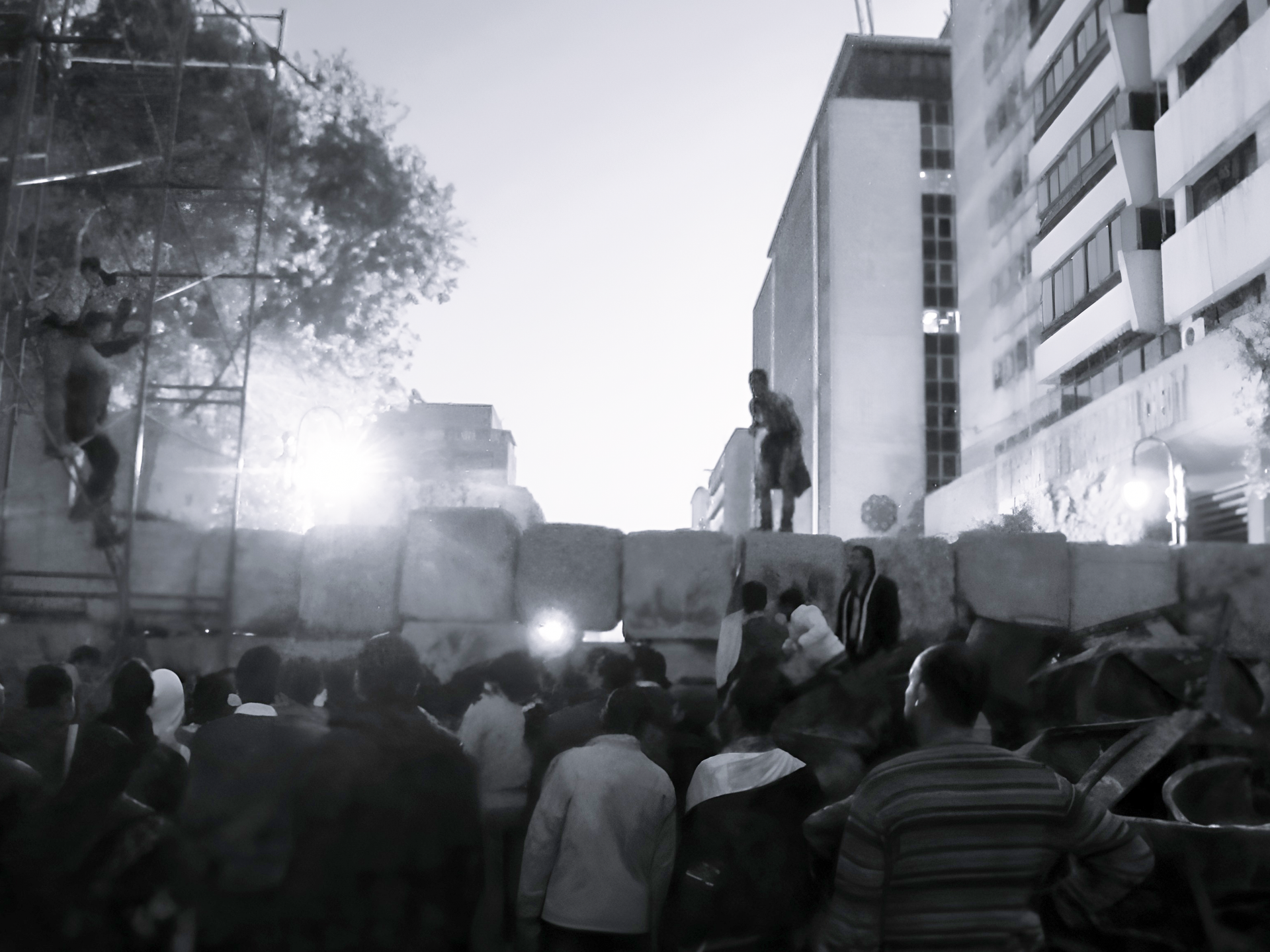For anyone who cares about democracy (or human rights, welfare, equality, etc), things have been pretty bleak recently. And I know a lot of people who are personally finding it extremely difficult to see any kind of hope in the future.
Knowing full well (and first-hand) the anxiety and fear it can induce, I wanted to share a few bits of belligerent optimism for anyone feeling the weight of (and perhaps even facing down) rising authoritarianism. This is by no means a grand theory or a strategy guide. Just some personal observations from moments when things looked frankly kinda terrible.
They come from time spent on the ground amidst revolution and democratic movements, alongside people trying (sometimes successfully, sometimes not) to build, defend and rebuild democratic space under pressure.
If you're feeling stuck, afraid, or unsure, that's normal. But there are ways through. And there’s value in remembering we’re not the first to face this kind of moment, and we won’t be the last.
On Authoritarian & Fascist Fragility
Authoritarianism is a hydra. But every new head is one more disproof of concept. Don't let fear of what comes next, stop you from addressing what's right in front of you. Authoritarian regimes often respond to crises by reinventing or replicating themselves under new symbols or leaders. But each iteration is an admission of prior failure, exposing the model’s inherent instability. Every time they iterate they fail a little harder.
Authoritarians survive by building walls. Democracy wins by breaking them. I've literally seen people who fought against a revolution turn and fight for it after a conversation and tea. Authoritarian control relies on isolation – physical, ideological, and emotional. Democracy, by contrast, is relational. Personal connections can shift allegiances in sudden, surprising and powerful ways.
Fascists thrive on division and espouse the notion of perfection. But making something better doesn't require us to be perfect. It requires generosity in the face of fear. Fascist movements weaponise idealised purity to exclude and control. Democratic progress accepts imperfection and leans on empathy and collective improvement as its strength. We have to know when to accept that not everyone can be everything, or have the right opinion about everything.
Authoritarianism makes enemies faster than friends. It always loses. It just takes time and could use help. By nature, authoritarian regimes alienate citizens, fracture coalitions, and destabilise their own centres of power. These systems are unsustainable in the long term, but opposition movements must endure and support each other to hasten their decline.
On Solidarity & Movement-Building
Solidarity against something is easy. Solidarity for something new is hard. However, the 'what' is generally less divisive than the 'how'. Use that. Opposition to a shared enemy unites quickly, but creating alternatives requires reconciling diverse ideas. On the flipside, people generally agree more on goals than on strategy, so focusing on shared ends can bridge tactical divides.
Politics turns debate into division. Articulating a clear, positive vision for the future helps counterbalance potential conflict. It also contextualises individual decisions. Partisan dynamics often intensify disagreement and the entrenchment of discourse in a complex economic, social and cultural environment offers a million threads to pull. Painting a picture of the future you want to build reframes internal disagreements as constructive rather than adversarial and helps communicate the 'why' for all the steps that get you there.
Everyone's scared. Be a refuge. Someone people can talk to, be around and trust. That safety becomes courage when it counts. Fear and anxiety are pervasive in times of political instability. Any kind of safety is attractive. Building emotional trust and community resilience by offering people a safe place they can, at the very least, be honest about how they're feeling, transforms that anxiety into collective readiness and eventually action.
Progressive movements struggle with unity because there's an inherently wider spectrum of ideas and possibilities. That’s not a weakness. It's just harder. Sorry. It might be a generalisation, but 'what could be' is always going to be a bigger (and more complicated) party than the 'what is or has been' of conservatism. The diversity of progressive movements reflects an openness and inclusivity. It complicates consensus but is fundamentally a strength worth defending.
Social self-actualisation is the foundation of democracy. You can organise strangers to fight, but when it's time to build, you need to know each other. Properly. In real life. A society that doesn't know itself is doomed to fall apart. Deep, participatory democracy requires authentic information to be shared across authentic relationships. The cascade that creates mobilisation can begin online or in a crisis, but sustainable democratic construction has to include scaffolding that supports communities and not just institutions.
On Power, Pressure & Collapse
Most people cave to authoritarianism, out of fear, complicity, or comfort. That’s not depressing. That’s your baseline. Every act of resistance is worth celebrating. The norm under authoritarianism is acquiescence. Acts of resistance, however small, represent a deviation from that norm, and each one is the seed of a better future.
Power erodes itself. The more is seized, the more force is needed to hold it. You can’t pressure-cook forever. Eventually, the lid pops. Authoritarians are desperate and constantly looking for new ways to cling to power. Spoiler alert: it's always force of one kind or another (be it legal, social, physical or otherwise). Yet what is built by force can only be maintained by force, and this creates growing pressure, which is simply unsustainable. No regime can repress indefinitely without sparking backlash or breakdown.
Belief systems don’t get replaced. They collapse. Mostly when confronted with lived experience. Be there with something better when they do. Ideological shifts can happen through debate. But more often they happen when realities collide so starkly that it creates questions and causes a shift. This most often happens internally, individual by individual. But sometimes it happens en masse. When this happens, institutions can collapse like a house of cards, and viable (positive) alternatives must be visibly present. If they aren't, people might latch on to something worse.
A gravity well centred on something good will eventually accrete everything around it. If people are star stuff (thanks Carl), then politics is gravity, and everyone is being pulled in innumerable directions at once. The result is a mess. But things do take shape. Narratives and cohesive visions draw us in, forming larger and larger bodies. Fear and hate are strong, but clarity and hope are stronger.
On Narratives, Networks & Cascades
The far-right is global. They're coordinated. They’ve got each other’s backs. So should we. Not just despite differences, but because of them. Transnational authoritarian networks are thriving because of mutual support and resource-sharing. Democratic resistance must embrace pluralism not just as a value, but as a strength in its own coordination.
Chaos is their strategy. Not just with information, but now in politics directly. That makes clarity revolutionary. Disinformation and institutional disruption are deliberate tactics. For the last few decades it has been applied to the information ecosystem, through media and social media, but now those actors are in power and kicking up dust everywhere we look. For policy makers, lawyers, activists, civil society organisations and almost everyone in some capacity it can feel like running to stand still. In such conditions, clear and truthful narratives are radical and essential.
Public action can go nowhere for ages, then explode from 10 to 10,000 in an afternoon. It's impossible to guess the right time and place. Just keep making times and places. Social movement theory shows that tipping points are unpredictable. Sustained small-scale action creates the conditions for mass mobilisation when the moment comes. And it will come.
At first, standing up feels like the least safe option. Until suddenly one day, it's the safest. That's when everything turns. Moments of mass defection or uprising often come suddenly. Early dissent feels dangerous, but as authoritarians alienate more and public sentiment shifts, resistance can quickly become the dominant, and safest, position. When that happens, victory is on the horizon.
And one final note regarding the picture at the top - while (sometimes literal) walls can be rebuilt bigger and stronger. All they’re ever going to achieve is encourage people to figure out better and more creative ways to smash them.

